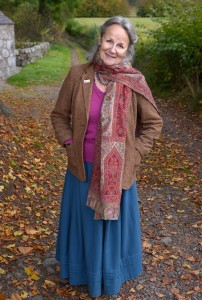Dr Margaret Bennett
ONE of Scotland’s most distinguished folklorists, as well as an internationally recognised singer, teacher, author and broadcaster, Dr Margaret Bennett’s work has brought her numerous honours from both sides of the Atlantic – appropriately enough, as much of her life has been spent between Scotland and Canada.
The late Hamish Henderson, a close friend and mentor, wrote of Margaret: “There can be few scholars on either side of the Atlantic who succeed in combining such a wide range of skills. A folksinger of great sensitivity and versatility, she is undoubtedly one of the major figures of the modern Scottish revival … Margaret embodies all that is best of the spirit of Scotland.”
In a distinguished career devoted to Gaelic and wider Scottish culture, she has won an impressive clutch of honours, for her folklore work and for books such as 2004’s widely selling Scottish Customs from the Cradle to the Grave, Oatmeal and the Catechism: Scottish Gaelic Settlers in Quebec (1999) and The Last Stronghold: Scottish Gaelic Traditions in Newfoundland (1989).
Born in 1946, Margaret grew up in Portree, Skye, amid a family of tradition bearers, with Gaelic on her mother’s side and Lowland Scots on her father’s. Her mother (from Glenconon, Uig) was a great singer and her grandfather was recorded back in 1910 by Marjorie Kennedy Fraser. Her father was a fine piper, as well as playing piano and clarinet, and also brought an Irish influence, as his father hailed from Co, Armagh. Margaret and her three sisters sang together into their late teens and whenever they could get together.
Primary schooling was in Portree, then, as her father’s civil engineering job relocated the family, her secondary school education was in Stornoway, Isle of Lewis, and Lerwick in Shetland. Afterwards, she trained as a teacher at Jordanhill College of Education (now Strathclyde University) where there was a lively Folksong Club. Very soon she became embroiled in Glasgow’s Sixties folk scene and while visiting Edinburgh University Folk Club she first encountered the genial and inspiring figure of Hamish Henderson, then at the height of his career as a folklorist, who influenced her subsequent career path.
In 1968 she emigrated to Newfoundland, where she lived for the subsequent eight years and took a post-graduate folklore course at Memorial University of Newfoundland, where she studied with Professor Herbert Halpert whose rigorous training, she recalls, influenced all her work thereafter. Under his guidance, she began recording the traditions of the Gaelic families of Newfoundland’s Codroy Valley, who had originally emigrated from the Isle of Canna and Moidart. Returning to Scotland with a post-graduate MA in folklore from Memorial University, she went on to do a PhD in ethnology at the University of Edinburgh, under the guidance of Dr John MacInnes and Dr Alan Bruford.
She also brought with her from Newfoundland her young son, Martyn, who would go on to carve a distinguished career of his own as an innovative and influential piper, violinist, composer and producer until his untimely death in 2005.
Margaret has been said to “wear her scholarship lightly”, and has always been as likely to be found singing in a folk club or giving a workshop as lecturing to students on either side of the Atlantic. Between 1984 and 1996 she lectured at Edinburgh University’s School of Scottish Studies. Since then, semi-retired, she teaches on the Royal Conservatoire of Scotland’s BA Scottish music course and, living in Perthshire, has been recording people from various walks of life there to conserve their reminiscences and traditions for future generations.
She instituted the Ochtertyre Song Weekends, which seek to bridge the divisions between Gaelic and Scots song, and which have featured guests such as Kenna Campbell, Rod Paterson, Sheila Stewart, Cathal McConnell and Gillebride MacMillan.
Margaret’s delicately expressive singing can be found on various recordings, notably In the Sunny Long Ago, an “old-timey” collection of songs in Scots, Gaelic and English which she recorded in 2000 with her son Martyn, Findlay and Hamish Napier and Gillian Frame. Another album, Glen Lyon: A Song Cycle (reissued in 2011) features purely Gaelic repertoire, including such magisterial material as Uamh an Oir (The Cave of Gold) and Griogal cridhe (Glen Lyon’s Lament), produced, arranged and accompanied by Martyn. Material from it featured in the widely acclaimed National Theatre of Scotland production, Black Watch.
Margaret has also produced several albums of traditional singers and collaborated with the Alan Lomax Archive on Gaelic Songs of Scotland: Women at Work in the Western Isles.
She has written more than a dozen books and contributed to some 40 others. Among her many awards are the Canadian Historical Association’s Clio Award for Quebec, for her book Oatmeal and the Catechism: Scottish Gaelic Settlers in Quebec; a Master Music Maker Award for her teaching in North Carolina; and joint winner of the Michaelis-Jena Ratcliff Folklore Prize for “a major contribution to the study of folklore in England, Scotland and Wales” for her book The Last Stronghold: Scottish Gaelic Traditions of Newfoundland. She was also runner-up in the Katherine Briggs Prize for Folklore for her widely selling Scottish Customs from the Cradle to the Grave.
Further recognition includes an Honorary Doctorate of Music from the former RSAMD (now the Royal Conservatoire of Scotland), and being made Honorary Professor in Antiquities and Folklore of the Royal Scottish Academy, Edinburgh.
Her most recent books have been Dileab Ailein: Newfoundland Traditions Across Four Generations, and, most recently, Jerome: Just one more Song!, a book and CD compilation of the repertoire of Newfoundland-Irish singer, the late Jerome Downey. In 2013, Margaret also featured, along with Norman MacLean and Sheila Stewart, in Blackbird, a feature film dealing with Scottish folk culture, directed by Jamie Chambers.
